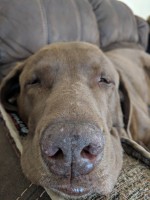Hops
|
Amount
|
Variety
|
Cost
|
Type
|
AA
|
Use
|
Time
|
IBU
|
Bill %
|
|
2 oz |
Amarillo2 oz Amarillo Hops |
|
Pellet |
8.6 |
First Wort
|
60 min |
31.17 |
11.1% |
|
4 oz |
Amarillo4 oz Amarillo Hops |
|
Pellet |
8.6 |
Boil
|
5 min |
11.3 |
22.2% |
|
2 oz |
Citra2 oz Citra Hops |
|
Pellet |
11 |
Boil
|
0 min |
|
11.1% |
|
2 oz |
Mosaic2 oz Mosaic Hops |
|
Pellet |
12.5 |
Boil
|
0 min |
|
11.1% |
|
2 oz |
Mosaic2 oz Mosaic Hops |
|
Pellet |
12.5 |
Dry Hop
|
1 days |
|
11.1% |
|
2 oz |
Citra2 oz Citra Hops |
|
Pellet |
11 |
Dry Hop
|
1 days |
|
11.1% |
|
2 oz |
Mosaic2 oz Mosaic Hops |
|
Pellet |
12.5 |
Dry Hop
|
3 days |
|
11.1% |
|
2 oz |
Citra2 oz Citra Hops |
|
Pellet |
11 |
Dry Hop
|
3 days |
|
11.1% |
|
18 oz
/ $ 0.00
|
Hops Summary
|
Amount
|
Variety
|
Cost
|
IBU
|
Bill %
|
|
6 oz |
Amarillo (Pellet) 5.9999999862754 oz Amarillo (Pellet) Hops |
|
42.47 |
33.3% |
|
6 oz |
Citra (Pellet) 5.9999999862754 oz Citra (Pellet) Hops |
|
0 |
33.3% |
|
6 oz |
Mosaic (Pellet) 5.9999999862754 oz Mosaic (Pellet) Hops |
|
0 |
33.3% |
|
18 oz
/ $ 0.00
|
Mash Guidelines
|
Amount
|
Description
|
Type
|
Start Temp
|
Target Temp
|
Time
|
|
6 gal |
|
Infusion |
-- |
160 °F |
90 min |
|
|
Let set for 10 min at 168 |
Temperature |
-- |
168 °F |
10 min |
|
|
fly sparge 90 min collect 13.9 G |
Fly Sparge |
-- |
168 °F |
90 min |
Starting Mash Thickness:
1.25 qt/lb
Starting Grain Temp:
60 °F |
Other Ingredients
|
Amount
|
Name
|
Cost
|
Type
|
Use
|
Time
|
|
1 each |
Whirlfloc
|
|
Water Agt |
Boil |
15 min. |
Priming
|
Method: co2
Amount: 10.65 psi
Temp: 40 °F
CO2 Level: 2.35 Volumes |
Target Water Profile
Balanced Profile
Notes
Water treated with brewing salts to our Hoppy New England flavour profile: Ca=100, Mg=18, Na=16, Cl=200, SO4=100 (Higher Chloride and lower Sulphate as compared to what is normally done with most American IPAs. This helps create the silky smooth and rich mouthfeel, pushing the hop flavours to be rounded and less sharp/dry). For complete details on how to adjust your water, refer to our step by step Water Adjustment guide.
The Flaked Oats (1-1.5L) do not need to be milled as they have already been rolled flat and toasted. Add them to the mash as is.
1.25 qt/lb mash thickness.
Single infusion mash at 160F for 90 mins.
While normal mash pH is typically 5.2-5.4 (when measured at mash temperature) you may want to aim on the higher end of this range to get a beer that is rounder/more full instead of sharp.
Raise to 168F mashout temperature and hold for 10 mins.
~90 min fly sparge with ~5.6-5.8 pH water (measured at mash temperature). At start of sparge add First Wort Hops to the boil kettle to let them steep as the wort is collected. Collect 13.9 gallons.
Boil for 60 minutes, adding Whirlfloc and hops per schedule at 15 and 5 minutes left.
Once boil is completed, quickly chill the wort to 180F (a copper immersion chiller works well - even the cheapest 25' x 3/8" immersion chiller will only take 2-3 minutes to chill from 212F to 180F). On our control panel, switch the BOIL PID to AUTO mode and set the temperature to 180F. This will hold the wort at 180F. Do not worry if you undershot the 180F target temperature slightly when chilling with the immersion chiller. Our control panel will quickly raise the temperature back to 180F and hold.
Add the steeping hops, put on the kettle lid, and wait 30 minutes. There is no need to stir the wort during this time. The control panel will fire the heating element periodically to maintain the 180F temperature which also gently stirs the wort through convection currents.
After the 30 minute steep turn off the heating element and chill the wort quickly to 66F (we use a one-pass convoluted counterflow chiller to quickly lock in hop flavour and aroma) and transfer to fermenter.
Aerate well. Pure oxygen from a tank may be used at a rate of 1 litre per minute for 60 seconds per 5 gallons.
Pitch yeast and ferment at 68F (wort temperature). I use modified stainless fermenting buckets in wine fridges.
Assuming you did not underpitch the yeast, after 24 hours you should be at high krausen (highest point of foaming). Add dry hops #1 directly to the fermenter.
Continue to ferment at 68F (wort temperature) until approximately 5 points from final gravity and then raise the temperature to 70-72F until finished. In our case we simply turn off the fermenting fridges and allow the beer to naturally rise to room temperature. Assume fermentation is done if the gravity does not change over ~3 days.
Add dry hops #2 to brite tank (we use 5 gallon glass carboys), purge with CO2 to avoid oxygen pickup, then carefully rack in the beer on top of the hops. Allow to steep for 3 days at 70-72F room temperature, gently swirling a few times a day. We do not recommend using hop sacks or other containers as you'll get the best flavour extraction from the hops if you let them roam free.
After 3 days in the brite tank package as you would normally. We rack to kegs that have first been purged with CO2, and then carbonate on the low side (around 2 volumes of CO2) to minimize carbonic bite and let the fruity hop and subtle malt flavours shine through. We chill the kegs to near freezing while carbonating at the same time in a 6-keg conditioning fridge. After ~1-2 weeks at serving pressure the kegs will be carbonated and ready to serve. Like most hop forward beers this New England Pale Ale is best consumed fresh so feel free to raise the CO2 pressure temporarily to 30-40 PSI to carbonate fast over a 24 period, and then turn back down to serving pressure. Some hop bits will have invariably made their way into the keg so we use a Hop Stopper Keg Edition filter to ensure that hops do not clog the dip tube and/or end up in the glass. Force carbonating at high pressure and using the Hop Stopper filter allows us to serve this beer 24 hours after kegging. There's no need to wait a few days for any hop bits that made their way into the keg to first settle out.
We do not recommend using finings such as unflavoured gelatin as it may "round off" hop flavours / aromas.

Last Updated and Sharing

- Public: Yup, Shared
- Last Updated: 2025-01-18 15:45 UTC
For quick copying and pasting to a text based forum or email.
Click the Download as HTML file button below.
Recipe costs can be adjusted by changing the batch size. They won't be saved but will give you an idea of costs if your final yield was different.
|
Cost $ |
Cost % |
| Fermentables |
$ |
|
Steeping Grains
(Extract Only) |
$ |
|
| Hops |
$ |
|
| Yeast |
$ |
|
| Other |
$ |
|
| Cost Per Barrel |
$ 0.00 |
|
| Cost Per Pint |
$ 0.00 |
|
| Total Cost |
$ 0.00 |
|
Discussion about this recipe:
